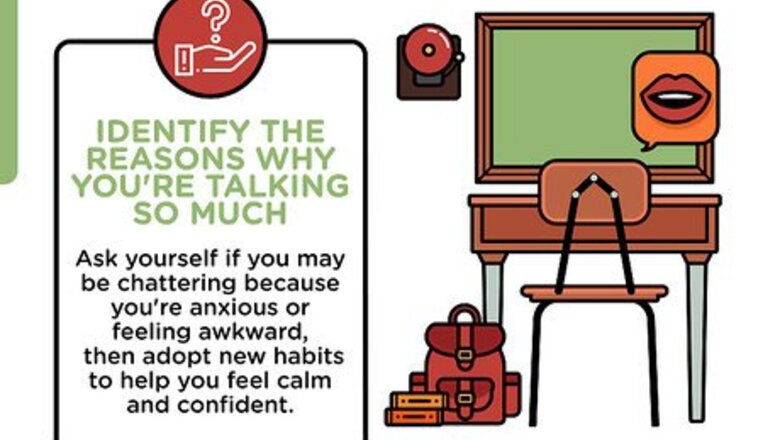
views
Learning to Be Quiet
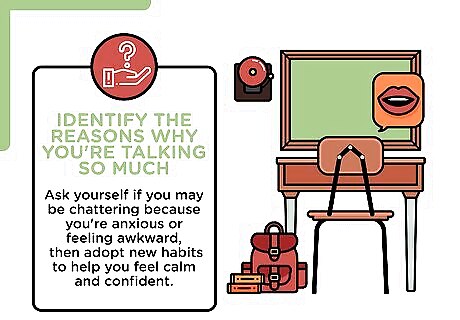
Identify the reasons why you're talking so much. Talking is an innate part of being human and helps you maintain social connections. However, it's also a way to cope with feelings of nervousness and stress. Ask yourself if you may be chattering because you're anxious or feeling awkward, then adopt new habits to help you feel calm and confident. Meditate to calm yourself. Visualize yourself staying calm and allowing others to speak. Spend some time sitting with your emotions. Consider how you're feeling, accept those feelings, and then release them. Journal to help you work through your thoughts.
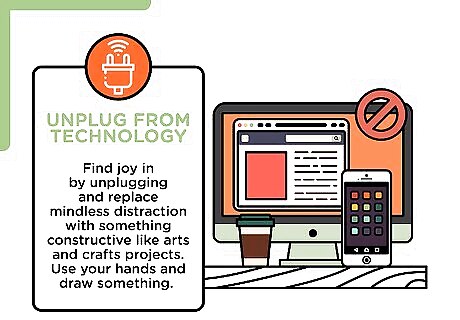
Unplug from technology. A lot of times, the need to talk is a reaction from being so overly stimulated by things you find on Twitter a viral video on YouTube, a snap from Snapchat, etc. Spend some time away from those distractions and reconnect with yourself. Find joy in silence by unplugging and replace mindless distraction with something constructive like arts and crafts projects. Use your hands and draw something. Practice the art of not reacting to anything and everything that is brought to your attention. Harness that energy and focus it on cutting and pasting things with your hands from scratch.
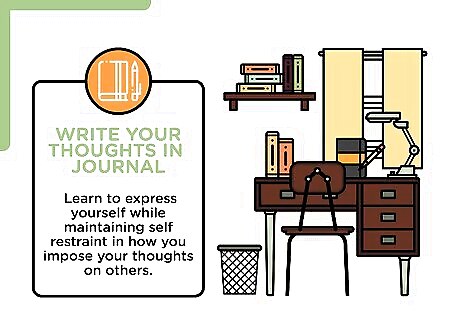
Write your thoughts in a journal. If the people around you seem increasingly disinterested in what you have to say, write it down in a journal. Learn to express yourself while maintaining self-restraint in how you impose your thoughts on others. If you're having trouble trying to find where to begin, keep in mind that journaling allows free-flowing thoughts – whatever that is to you. It doesn't have to make sense or have rhyme or reason, etc. Google journaling prompts online to help act as a starting point if need be. Journal in the traditional way with a paper and pen or write your thoughts in an empty document on your PC.
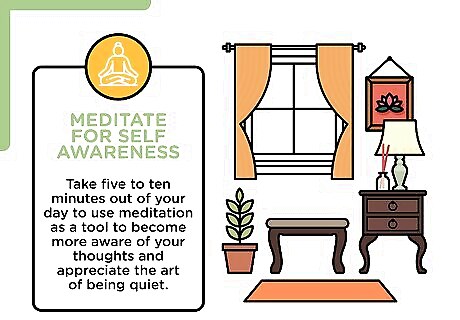
Meditate for self-awareness. Meditation doesn't have to be an intense yogi experience where you sit in absolute silence with your back against the wall as you "om". Take five to ten minutes out of your day to use meditation as a tool to become more aware of your thoughts and appreciative of the art of being quiet. You can find several apps to help you with your meditation, including Insight Timer, Calm, and Headspace. If being in absolute silence intimidates you, meditate in other ways and in other areas. Meditate in the shower, center yourself, or allow music to act as a soundtrack in those moments. The more you practice, the more at ease with yourself you will become and you will start to realize that you don't have to beg people to notice you through talking. You will realize your power is in your presence and the overcompensation will lessen dramatically.
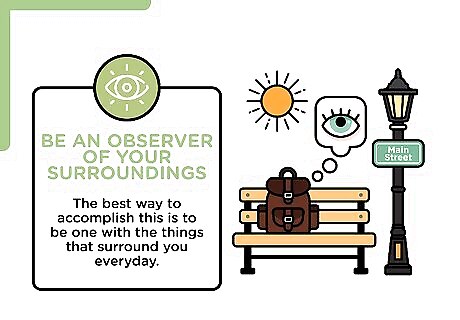
Be an observer of your surroundings. Often the key to being quiet in an organic way is to insert yourself in situations that demand your attention in a healthy way. The best way to accomplish this is to be one with the things that surround you everyday. Take 10-15 minutes to go outside and appreciate the sun and wind on your body. Admire the clouds in the sky, their shapes, and their sizes. Take a walk down a busy street and pay attention to all of the sights and sounds as they pass you by. After a while, see if you can isolate which sounds come from where: a car honk in the distance, a baby crying right next to you, a text message alert, etc.
Becoming a Better Listener
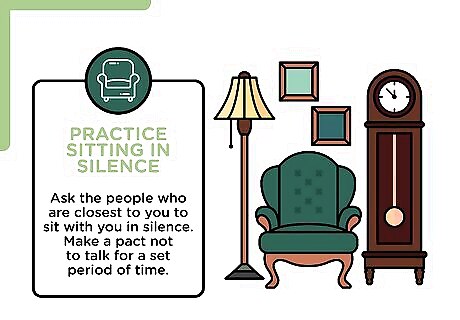
Practice sitting in silence. If you feel uncomfortable in silence, then you'll feel internal pressure to fill that silence with speech. You then talk too much to cope with the awkward feelings brought on by the silence. Luckily, you can learn to sit with these feelings through practice. Ask the people who are closest to you to sit with you in silence. Make a pact not to talk for a set period of time. Keep doing this until you don't feel awkward anymore.
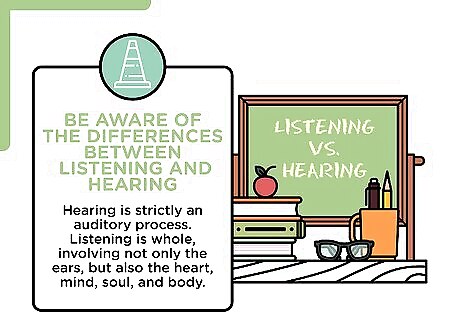
Be aware of the differences between listening and hearing. Hearing is strictly an auditory process. Listening is whole, involve the ears and also the heart, mind, soul, and body. Find genuine interest in being present with people you're speaking with. Give attention, show concern, and prepare yourself to learn something from people you interact with. Put yourself on the back burner and listen without expectation or need to fill space with talking about yourself.
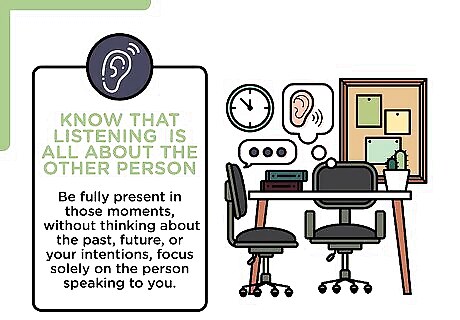
Know that listening is all about the other person. When you quiet your talking and focus less on bringing attention to yourself, you free your focus up to the person you're talking to and for better listening. Good listening is 80% being patient and listening to the other person without interruption and 20% reflecting and following up for more information. Be fully present in those moments, without thinking about the past, future, or your intentions, focus solely on the person speaking to you.
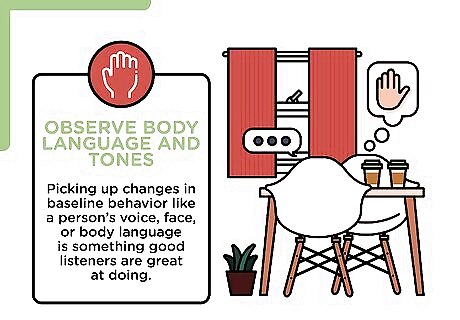
Observe body language and tones. Picking up changes in baseline behavior like a person's voice, face, or body language is something good listeners are great at doing. Adapt to those changes accordingly as you listen. If the speaker, your friend, has tension in their voice, face, or body language suddenly, it's up to you to appear non-confrontational and relaxed to mellow out the situation. If the speaker, or your friend, seems emotionally charged and is raising his or her voice suddenly, nod your head in concern or lean forward to make the person feel like they have support in their emotions.
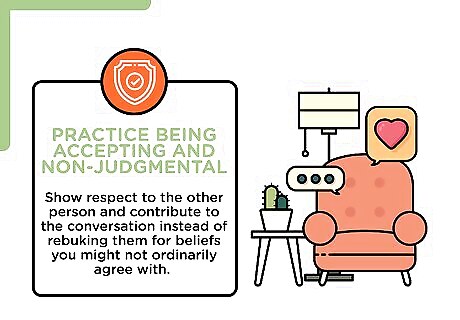
Practice being accepting and non-judgmental. When you listen to someone without being judgmental in your responses, you prevent them from shutting down and help them feel a sense of freedom and acceptance. You also gain acceptance from them too. Respect the other person and contribute to the conversation rather than judging beliefs you might disagree with. Remember facial expressions such as a visible wince, eye rolls, or body language speak as loudly as any verbal judgmental response would. Accepting someone's ideas does not necessarily mean you agree with them. Keep in mind that understanding through listening does not mean your opinions become mutually in sync with one another.
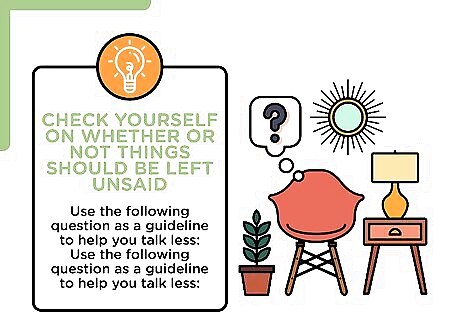
Check yourself on whether or not things should be left unsaid. Rationally decide when it is okay to listen and when it is okay to respond and ask follow-up questions. Timing and restraint is everything. Think of the outcome of talking. Will it affect the conversation and relationship positively or negatively? Never let your desire to impress ruin how you relate to people. Use the following question as a guideline to help you speak less: "Do I want to speak to add true content or am I just trying to fill up space?"
Participating in Everyday Conversations
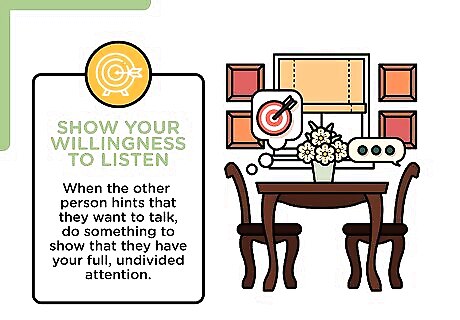
Show your willingness to listen. When the other person hints that they want to talk, do something to show that they have your full, undivided attention. Close the book you're reading or put down your phone. Make sure your body language reads fully engaged. Lean forward slightly and maintain eye contact as they speak to you. Smile softly if the tone of the conversation calls for it and give an occasional nod to show that you're listening without talking to interrupt. To show that you understand what's being said, summarize and repeat what was said to you by paraphrasing.
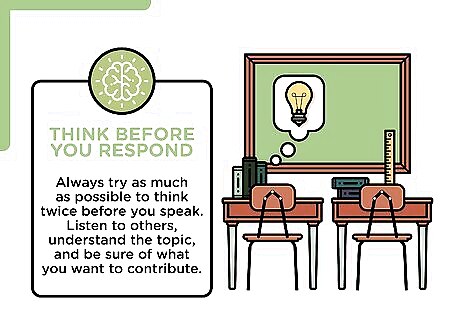
Think before you respond. Always try as much as possible to think twice before you speak. Listen to others, understand the topic, and be sure of what you want to contribute. Avoid saying more than you have to be by taking a moment to reflect after the speaker asks you for your opinion. Pause for a beat, even say, "Give me a minute to think about it." Reflect, exercise restraint, and then add your two cents to the conversation.
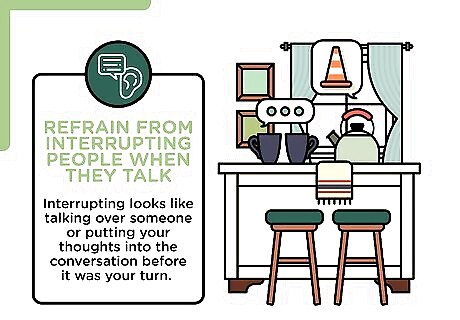
Refrain from interrupting people when they talk. Interrupting looks like talking over someone or putting your thoughts into the conversation before it was your turn. Let the person speak; you will get your turn to contribute and avoid making the other person feel invalidated in the process. If you're trying to interrupt someone while they're speaking, try bookmarking it as a mental note until they're done. If you'd rather have something tangible, use a notepad or your phone to jot down your thoughts and talk about them when it's your turn to speak. Try to catch yourself in moments where you interrupt the other person. Look at them for facial cues, like an eye roll or a glance to the side, to keep you alert about your actions. Once you catch yourself, just say, "Oh, I'm sorry, go on." or "My bad, go ahead."
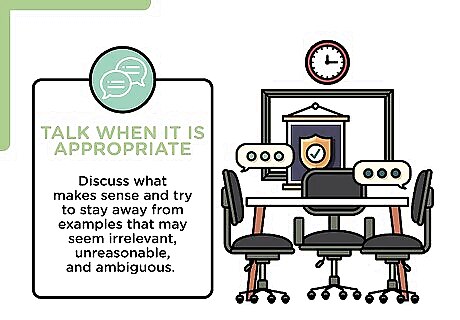
Speak when it is appropriate. Try to stay on topic. Discuss what makes sense and try to stay away from examples that may seem irrelevant, unreasonable, and ambiguous. Give simple facts and clear logic that will help the listener to gain some sense. Use the silence and the context of the conversation as guidelines of when to talk. If someone is venting to you, it's probably not a great time to talk about a rave you have been trying to attend for weeks. If you don't know what you want to say, ask more investigative questions, such as what does this mean? Who can we hold responsible, how, and why? This encourages the person to speak more. Try to ask open-ended questions, as they allow the person to speak more while allowing you to speak less.



















Comments
0 comment